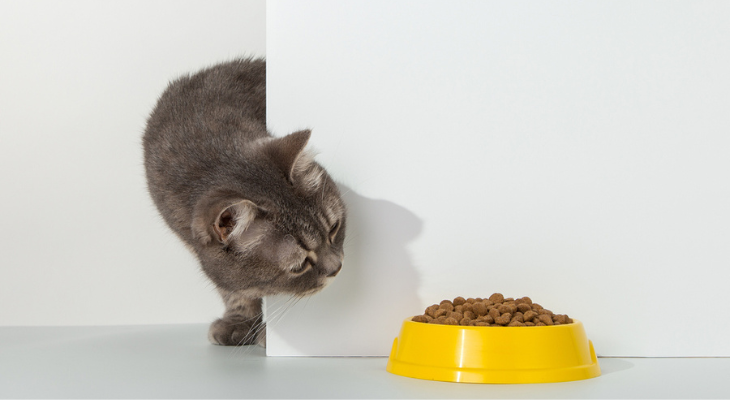
The Benefits of Proper Nutrition for Pets
Good nutrition offers important health advantages for your pet. Without the proper amount of vitamins, minerals, fats, and proteins in its diet, your pet could develop a variety of health problems. Ensuring that your pet's food contains the ideal nutrients for its age or breed will help you protect your furry friend.
7 Ways Nutrients Protect Your Pet's Health
Feeding your pet a nutritious diet offers these health benefits:
- Healthier Skin and Coat. Fats in pet foods, including omega-6 and omega-3 fatty acids, are essential for healthy hair and skin. Without adequate amounts of fats, your pet's coat may look dull and dry or its skin may become inflamed and itchy. Hair loss can also occur if your pet's diet doesn't include sufficient fats.
- Strong Bones and Muscles. Protein found in meat, poultry, lamb, and fish helps your pet build and maintain strong muscles. Protein is made up of amino acids, like arginine, leucine, methionine, lysine, and taurine, that are needed for growth and muscle repair. Taurine is particularly important for cats. Without enough taurine in their diets, cats can develop eye or heart problems. Minerals, including phosphorous, calcium, potassium, magnesium, and sodium, keep teeth and bones strong and are essential for muscle contraction.
- Natural Energy. Your furry friend would become tired and weak without the healthy fats in pet foods. Fats are an important source of energy and are needed for vitamin absorption. Vitamins help turn carbohydrates, fats, and proteins into energy. Although fats provide more energy for pets than carbohydrates, carbs still play an important role in energy production. Minerals, like thiamine, are also crucial for energy metabolism.
- Vigorous Immune System. A healthy diet boosts your pet's immune system and helps it fight illnesses and infections. Fats, proteins, amino acids, and vitamins A and E provide important immune system support.
- Healthy Digestion. Fibers in carbohydrates help your pet's gastrointestinal system digest nutrients and make it easier for your pet to eliminate waste, according to the Pet Food Institute. Without enough fiber, your pet could suffer from constipation.
- Good Vision. Vitamin A, lutein, lycopene, and beta-carotene keep your pet's vision clear and sharp. These nutrients are antioxidants, a type of molecule that prevents damage to cells caused by free radicals. In a study published in the Journal of Nutritional Science, researchers noted that beagles that received antioxidant supplements for six months showed improvements in retinal function and decreased refractive errors.
- Other Benefits. A healthy mix of nutrients is needed for good organ health, nerve and brain development, and function, heart health, reproduction, and hormone and blood production.
Choosing the Best Food for Your Pet
All pet foods are not the same. Some are loaded with fillers and skimp on essential nutrients, like proteins, vitamins, and fats. Eating these foods is equivalent to a junk food diet for people. Although the food may fill your pet up, it won't provide the nutrients your pet needs to stay healthy.
When you shop for pet food, look for packages that note that the product meets Association of American Feed Control Officials (AAFCO) requirements or provides complete and balanced nutrition. Take a look at the ingredients in the food too. The healthiest foods will list a protein source, like beef, poultry, or chicken, first. Less nutritious foods list corn, soybean meal, wheat gluten, and other fillers first.
Keep in mind that pets need different types of food depending on their life stage. For example, kittens and puppies need higher-calorie food packed with nutrients for normal growth and development. Although puppy and kitten foods are ideal for young pets, they can cause weight gain in older pets. Senior pets typically need even fewer calories than younger adult pets and may benefit by eating special senior diets. If your pet has a health condition, like diabetes, arthritis, or kidney disease, a special prescription diet may be a good idea.
Not sure if your pet's diet is healthy? Get in touch with us to ask a question or schedule your pet's next visit.
Sources:
Association of American Feed Control Officials: How to Understand a Dog or Cat Food Label
https://www.aafco.org/consumers/understanding-pet-food/reading-labels/#labelformat
NCBI: Journal of Nutritional Science: Antioxidant Supplementation Increases Retinal Responses and Decreases Refractive Error Changes in Dogs, 5/10/2016
https://www.ncbi.nlm.nih.gov/pmc/articles/PMC4891559/
Pet Food Institute: Dog Nutrition
https://www.petfoodinstitute.org/about-pet-food/nutrition/dog-nutrition/
WebMD: Your Pet's Nutrition Needs, 8/30/2022
https://www.webmd.com/pets/dog-cat-nutrition
PetMD: Should You Feed Your Pet Prescription Dog Food? Here's When It's a Good Idea, 12/20/2022
